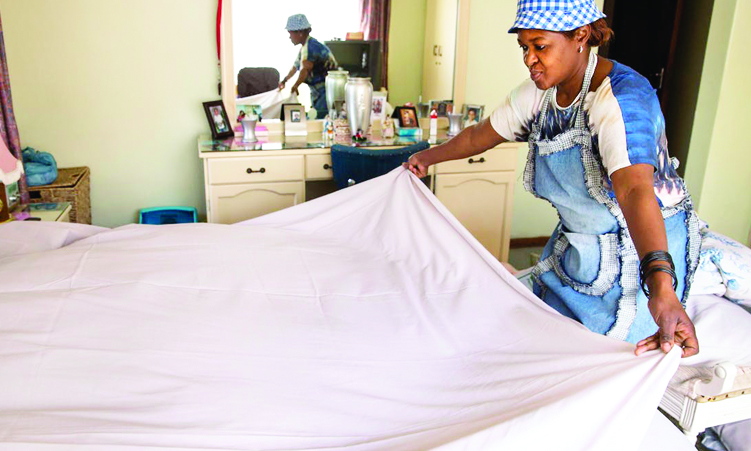Namibian domestic and agriculture workers will get a N$3 and N$4 annual increment respectively.
Starting 1 January 2025, the minimum wage for employees will be set at N$18 per hour. However, domestic workers will receive N$12 per hour in 2025, increasing to N$15 in 2026, and N$18 in 2027.
Agricultural workers will start at N$10 per hour in 2025, rising to N$14 in 2026, and N$18 in 2027.
Some critics told The Namibian that the gazetted minimum wage will fail to address systemic issues and ultimately harm the workers it aims to protect.
Political activist Michael Amushelelo says just because something is gazetted doesn’t mean it will be enforced.
“As per usual, companies are not going to comply. In fact, I foresee legal battles emerging from this particular gazetting,” he says. Amushelelo doubts the government will implement the bill. “This most certainly feels like another election gimmick to pretend that they care about workers,” he says.

Namibia Revolutionary Transport Union leader Petersen Kambinda says he commends the government for gazetting a national minimum wage.
He says many Namibians have been earning “slave wages”.
“We hope the next step is to address specific sectors and industries. For everyone to feel protected and valued in the Namibian House, their income needs to be regulated,” he says.
Kambinda says if wages are generalised, economic freedom will not be achieved. “Compliance is a very big problem we have as a country,” he says.
Minister of labour, industrial relations and employment creation Utoni Nujoma say the minimum wage will be reviewed after two years.
The calculation of wages under this order excludes any payments made for performing duties, allowances for travel, housing, or professional matters, gratuities like bonuses or tips, overtime pay, additional pay for Sunday or public holiday work, night work pay, and payments related to pensions, annuities, medical benefits, or insurance.
“By enshrining a minimum wage in law, we are not only safeguarding workers’ rights, but also paving the way for a more equitable economy.” says Nujoma.
Political analyst Johan Coetzee says the minimum wage policy can be beneficial if it mitigates the risk of exploitation.
“This occurs when an employer abuses the oversupply of labour to reduce wages to levels below those offered by profitable businesses,” he says. Coetzee says minimum wage can be counterproductive if used as a tool during an election year, rather than being based on what the market can afford.
“The minimum wage, which was not approached systemically, may reduce the current standard of living of the lowest-paid workers,” he says.
“It will result in less demand for labour, and an increase in unemployment of the lowest skilled and lowest paid workers,” he says. Labour analyst Herbert Jauch says the introduction of the new national minimum wage will improve the lives of many Namibians stuck in low-paying jobs.


“The majority of Namibian workers earn around N$2 000 and even below that per month. Now with that N$18 per hour, that would at least lift them over an amount of N$3 000 per month,” he says.
He says it would lift the earnings of the bottom segment of the labour market.
Jauch raised concerns over adhering to the order, saying there have been major weaknesses in complying with the sectoral minimum wages that cover sectors like construction, farming, domestic workers, and security guards.
“Although the minimum wages there are stipulated, they are currently below the national minimum wage that will come into being, but even these lower sectoral minimum wages were often not implemented,” he says. Jauch says workers and unions need to be prepared to make sure employers comply with the order.
“When we look at costs of living in Namibia now, the national minimum wage of N$18 per hour is certainly not enough to lead a decent life,” he says.
Namibia Economic Freedom Fighters deputy president Kalimbo Iipumbu says the decision is questionable.
“Decisions must be impactful and made bearing in mind that poverty in Namibia is an emergency. The Swapo government is being dishonest by greenlighting this benefit and only making it possible to enjoy next year,” he says. Kalimbo says the bill must be predicated against inflation.
Popular Democratic Movement (PDM) leader McHenry Venaani says the government needs to stop making moves for elections only. “I have been very consistent in calling for a national minimum wage in all sectors. If you look at the cost of living today, N$18 could not even try to attempt to address that issue per hour,” he says.
Venaani is accusing the government of not consulting properly.
“While the introduction of a minimum wage across all sectors is a positive step, it is a superficial response that doesn’t adequately address the underlying problems of inflation and the cost of living.
“N$18 as a minimum wage is insufficient in tackling the real economic challenges facing the country. It’s a knee-jerk reaction,” he says.
Stay informed with The Namibian – your source for credible journalism. Get in-depth reporting and opinions for
only N$85 a month. Invest in journalism, invest in democracy –
Subscribe Now!






